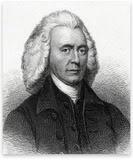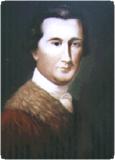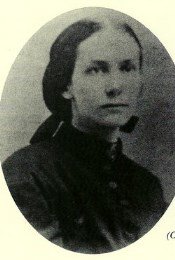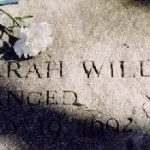Wife of Virginia Statesman Edmund Pendleton
Sarah Pollard was born on May 4, 1725, daughter of Joseph and Priscilla Pollard. Edmund Pendleton was was born into the Virginia colony’s elite on September 9, 1721, in Caroline County, Virginia. However, his father’s early death and the subsequent loss of the family’s property left Pendleton to shift for himself. His upper-class origins eventually served him well, but his early years were ones of struggle.
At age thirteen Pendleton was apprenticed to the Clerk of Court of Caroline County, where he learned the legal trade. In 1737, he was made clerk of the vestry of St. Mary’s Parish in Caroline and with the small profits made there he procured a few law books. In 1740, he was made clerk of the Caroline Court. He was married on January 21, 1741, to Betty Roy, who died in childbirth November 17, 1742. The infant son also died shortly thereafter.
Edmund Pendleton married Sarah Pollard on January 20, 1745. Edmund and Sarah had no children; however, he was involved in the legal education of at least two nephews, John Penn (signer of the Declaration of Independence) and John Taylor of Caroline, U.S. Senator.
Pendleton was licensed to practice law in April of 1741 and was admitted to the bar in 1745. His success before the county courts caused him to become a member of the General Court in October 1745. He was appointed a Justice of the Peace for Caroline County in 1751, and from 1752-1776 he was a member of the Virginia House of Burgesses.
John Robinson Estate Scandal
Edmund Pendleton’s mentor John Robinson served as Speaker of the House of Burgesses and treasurer of the colony of Virginia from 1738 until his death. After Robinson’s death in May 1766, Pendleton was shocked to discover that Robinson’s estate had debts of 50,000 pounds. Pendelton then placed a notice in the Virginia Gazette that all people in debt to Robinson should “make immediate payment.”
Records from the colonial treasury revealed that Robinson had been using the paper money he was supposed to destroy and lending it to friends or using it to pay his personal debts. In December 1766, a staggering report came to the House of Burgesses indicating that Robinson’s estate owed the colony more than 100,000 pounds.
The resulting scandal was a factor in Virginia politics for years; Robinson’s estate was not settled until after the end of the American Revolution. After that, the roles of speaker and treasurer were separated.
Political Career
Although an arch-conservative, Pendleton was able to walk a middle line between the wealthy planters and the common farmers and merchants. His policies were always those of sound economics and conciliation. However, as the years of the Revolution dawned he would prove himself to be a rebel in good standing.
Pendleton wrote and pushed to passage a bill which reorganized the Virginia militia. This bill put into place a hardened group of native-born troops who defended Virginia in the bloodiest days of the French and Indian War. Later, it would form the core of the force which Virginia would send to the Continental Army during the Revolutionary War.
Pendleton’s personal reputation and skill as a lawyer grew and his services were in great demand. After the royal governor dissolved the House of Burgesses in 1773, they returned to Williamsburg and convened themselves independently. This convention passed resolutions protesting taxation without representation and other outrages by the crown.
Edmund Pendleton, Patrick Henry and George Washington were among those elected to represent Virginia at the Continental Congress in Philadelphia in 1774.
The three delegates met at Mt. Vernon and went north to Philadelphia together. Pendleton and Henry were old enemies, the former the leader of the conservatives and the latter the head of the radicals. The tyrannical policies of George III united the two in a common cause, but they would never really see eye to eye. Pendleton always feared open defiance to the crown would lead to bloodshed. He would favor conciliatory policies until the eve of the Revolution.
Pendleton also served on the Virginia Committee of Correspondence and was President of the Virginia Committee of Safety from August 16, 1775, to July 5, 1776, (effectively serving as governor of the colony). In May 1776 he was appointed President of the Virginia Convention, which authorized Virginia’s delegates to move for a break from Britain, which resulted in the following document.
Resolutions of the Virginia Convention Calling upon Congress for a Declaration of Independence:
For as much as all the endeavors of the United Colonies, by the most decent representations and petitions to the king and parliament of Great Britain to restore peace and security to America under the British government and a re-union with that people upon just and liberal terms instead of a redress of grievances, have produced from an imperious and vindictive administration increased insult oppression and a vigorous attempt to effect our total destruction.
By a late act, all these colonies are declared to be in rebellion, and out of the protection of the British crown our properties subjected to confiscation , our people, when captivated, compelled to join in the murder and plunder of their relations and countrymen, and all former rapine and oppression of Americans declared legal and just.
Resolved unanimously, that the delegates appointed to represent this colony in General Congress be instructed to propose to that respectable body to declare the United Colonies free and independent states, absolved from all allegiance to, or dependence upon, the crown or parliament of Great Britain; and that they give the assent of this colony to such declaration, and to whatever measures may be thought proper and necessary by the Congress for forming foreign alliances and a confederation of the colonies, at such time, and in the manner, as to them shall seem best: Provided, that the power of forming government for, and the regulations of the internal concerns of each colony, be left to the respective colonial legislatures.
Resolved unanimously, that a committee be appointed to prepare a Declaration of Rights, and such a plan of government as will be most likely to maintain peace and order in this colony, and secure substantial and equal liberty to the people.
Edmund Pendleton, President
This document was sent to the Virginia Delegation at the Continental Congress and on June 7, 1776, Virginia delegate Richard Henry Lee proposed independence, stating that “these colonies are, and of right ought to be, free and independent states.” This paved the way for the Declaration of Independence, written by another Virginian, Thomas Jefferson.
After the Declaration, Pendleton became the first Speaker of Virginia’s new House of Delegates although an accident caused him to miss the first session. A fall from a horse in March of 1777 dislocated his hip and crippled him so that he used crutches for the rest of his life, but did not stop him. Pendleton, Thomas Jefferson and George Wythe revised Virginia’s law code.
Pendleton was appointed Judge of the High Court of Chancery in 1777. When Virginia created a Supreme Court of Appeals in 1778, Pendleton was appointed its first president where he served until his death. He served as president of the Virginia Convention that ratified the U.S. Constitution in 1788.
Known always as a modest and honorable man, Edmund Pendleton spent his entire life in service to the people of Virginia. In 1788, Washington appointed him to the new Federal Judiciary, a job which he declined due to advancing age. He continued to serve as the President of the Virginia Supreme Court of Appeals until his death.
Edmund Pendleton died on October 23, 1803, in Richmond, Virginia. His death came as a shock to the Governor’s Council where his attendance had been expected that morning. He was buried at his estate, Edmundsbury.
At 82 years of age, he was still a venerated figure in national politics. In a gesture of mourning, the U.S. House and Senate wore black arm badges for 30 days as “an emblem of their veneration for his illustrious character, and of their regret that another star is fallen from the splendid constellation of virtue and talents which guided the people of the United States in their struggle for Independence.”
In 1907, the remains of Judge Edmund Pendleton, his two wives and infant were disinterred at Edmundsbury and buried inside Bruton Parish Chapel at Colonial Williamsburg, Virginia.
Sarah Pollard Pendleton died sometime after 1815 at Caroline County, Virginia.
SOURCES
Edmund Pendleton
Wikipedia: Edmund Pendleton
Caroline’s Most Distinguished Son
Colonial Williamsburg: Edmund Pendleton






